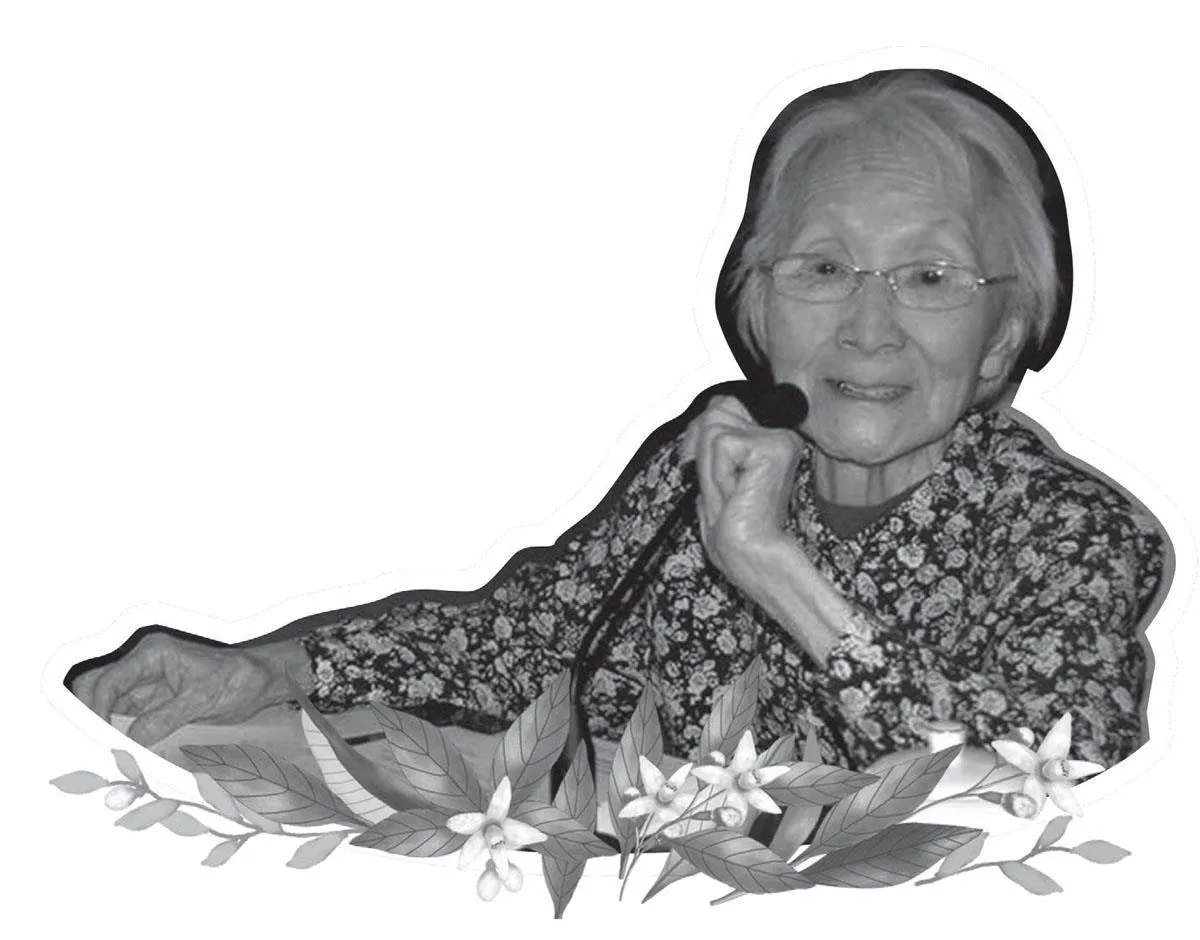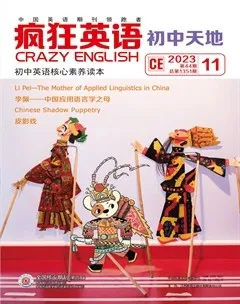Li Pei—The Mother of Applied Linguistics in China李佩——中国应用语言学之母





In December 1917, Li Pei was born into a scholarly family inZhenjiang. At the age of 19, she was admitted to the Departmentof Economics at Peking University. During the War of ResistanceAgainst Japanese Aggression, she studied at South-WestAssociated University and served as the vice president of thestudent union. In 1945, she was selected as a representative ofChinese women to attend the First World Women’s Conferenceheld in Paris, and delivered a speech due to her distinguishedorganizational skills and fluent English. In February 1947, Li Peipursued her studies at Cornell University in the United States.In February of the following year, she married Guo Yonghuai,her 1)upperclassman of South-West Associated University as wellas a professor at Cornell University.
In 1951, Li Pei taught Chinese in the Department of Linguisticsat Cornell University. Despite being abroad, Li Pei was alwaysconcerned about the development of her homeland. In September1956, Li Pei and her husband Guo Yonghuai 2)overcame numerous3)obstacles and set out to return to China with their 5-year-olddaughter.
Upon returning to China, Li Pei took up a role in an office in thewestern suburbs of Chinese Academy of Sciences. She promotedthe establishment of the first kindergarten and primary school inZhongguancun. In 1961, Li Pei was transferred to theForeign Language Teaching and Research Officeat University of Science and Technology of Chinaas an English teacher. In the winter of 1968, LiPei suffered from extremely unfair treatment,and her husband Guo Yonghuai sacrificedhis life for China’s nuclear industry, whichwas a 4)fatal blow to her. However,in the face of adversity, she continued to devote herself wholeheartedlyto China’s education with unimaginable perseverance and spirit.
In April 1978, Li Pei served as the director of the Foreign LanguageTeaching and Research Office at the Graduate School of University ofScience and Technology of China. She sought English education talentseverywhere. Li Pei took the lead in compiling teaching materials, andthe first set of graduate series textbooks she wrote won the NationalExcellent Book Award and has been in use until today. Throughdiscussions with many foreign teachers, Li Pei reformed the teachingmethods of English in China based on the GRE exam, combiningscientific knowledge with foreign language teaching. Her innovativeteaching strategies were recognized as the pioneering work on AppliedLinguistics by experts. In response to the shortage of English educationtalents in Chinese universities at that time, Li Pei farsightedly began thefirst Applied Linguistics graduate teacher training program in China.
Though she retired from teaching in 1998, Li Pei did not slow downher pace of dedicating herself to society. At the age of 81, she set upZhongguancun Lecture Hall. She invited top scientists and experts inthe humanities and arts fields at home and abroad to give lectures, andall expenses were subsidized by her personally. This forum persisted formore than 600 sessions and became a hall of knowledge that influencedseveral generations. In 2008, she donated her savings of 600,000 yuanto Institute of Mechanics, Chinese Academy of Sciences and Universityof Science and Technology of China respectively.
In her later years, Li Pei lived in a small room inZhongguancun. She wore old clothes, but they werealways clean and tidy. Her hair was still neatly combedas what it used to. On January 12, 2017,Li Pei passed away peacefully at the ageof 99. Her ashes were interred togetherwith GuoYonghuai’s beneath his statuein Institute of Mechanics of ChineseAcademy of Science.
On July 20, 2018, theInternational Astronomical Unionannounced that two asteroidswere named after Chinese names.The asteroid numbered 212797 waspermanently named “Li Pei”; the asteroidnumbered 212796 was named “Guo Yonghuai”. The two celestialbodies are also known as the only twin asteroids in the world thatare named in honor of a married couple. Li Pei and her husbandreunite again in space as stars, making the whole world look up inawe.
1) upperclassman n. 高年级学生
2) overcome v. 克服;解决
3) obstacle n. 障碍;障碍物
4) fatal adj. 致命的;灾难性的
1917年12月,李佩生于镇江的书香门第。19岁时,她考入北京大学经济学系。抗日战争期间,她在西南联合大学求学,担任学生会副主席。1945年,李佩因出色的组织能力和流利的英语,被选为中国妇女代表,出席了在巴黎举行的第一届世界妇女大会,并作大会发言。1947年2月,李佩赴美国康奈尔大学学习。次年2月,李佩与西南联合大学学长、康奈尔大学教授郭永怀结婚。
1951年,李佩在康奈尔大学语言学系教授中文。虽然身在国外,李佩却时刻心系祖国的发展。1956 年9月,李佩与丈夫郭永怀带着5岁的女儿克服重重阻碍启程回国。
回国之初,李佩在中国科学院西郊办公室工作,她推动建成了中关村第一所幼儿园和第一所小学。1961年,李佩调入中国科学技术大学外语教研室任英语教师。1968年冬天,李佩饱受极其不公正的对待,而丈夫郭永怀为中国的核事业献出生命对她更是致命的打击。面对多舛的命运,她却以常人难以想象的毅力、精神,继续全身心投入祖国的教育事业。
1978年4月,她担任中国科学技术大学研究生院(今中国科学院大学)外语教研室主任。她四处寻求英语教育人才。李佩率先主持自编教材,她编写的第一套研究生系列教材荣获国家优秀图书奖,一直被沿用至今。在与多名外籍教师的探讨下,李佩根据研究生入学考试的情况,将国内英语的教学方法进行改革,将科学知识和外语教学相结合,她的这种教学方法,被专家称作“开创了应用语言学的先河”。针对当时我国高校英语教育人才匮乏的情况,李佩又高瞻远瞩地创办了国内首期应用语言学专业研究生师资班。
1998 年,李佩离开了教学岗位,却没有放慢她奉献的脚步。81岁那年,她创办“中关村大讲坛”。她邀请国内外顶尖科学家、人文艺术领域的大家开讲,所有费用都由她个人出资补贴,这个论坛坚持了600 多期,成为影响几代人的知识圣殿。 2008年,她将自己60万元的积蓄分别捐赠给了中国科学院力学研究所和中国科学技术大学。
晚年的李佩一直住在中关村一间小小的屋子里,她身上穿的是旧衣服,却永远干净整洁。头发依旧梳得整整齐齐,一如往昔。2017年1月12日,李佩静静地离开了,享年99 岁。人们将她与郭永怀的骨灰一起合葬在中国科学院大学郭永怀雕像下。
2018年7月20日,国际小行星中心发布公告,两颗小行星以中国人的名字命名。编号为212797号的小行星被永久命名为“李佩星”;编号212796的小行星被命名为“郭永怀星”。这对夫妻双子星的荣誉,在全世界都是独一无二的。李佩与丈夫以星星的身份再度在太空相遇,让世人仰望。

